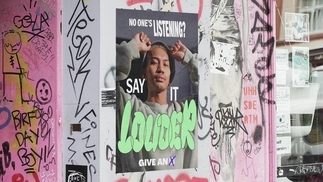PHONIC BOOM!
In October 2013 London’s best-known record shop, Phonica has turned 10.
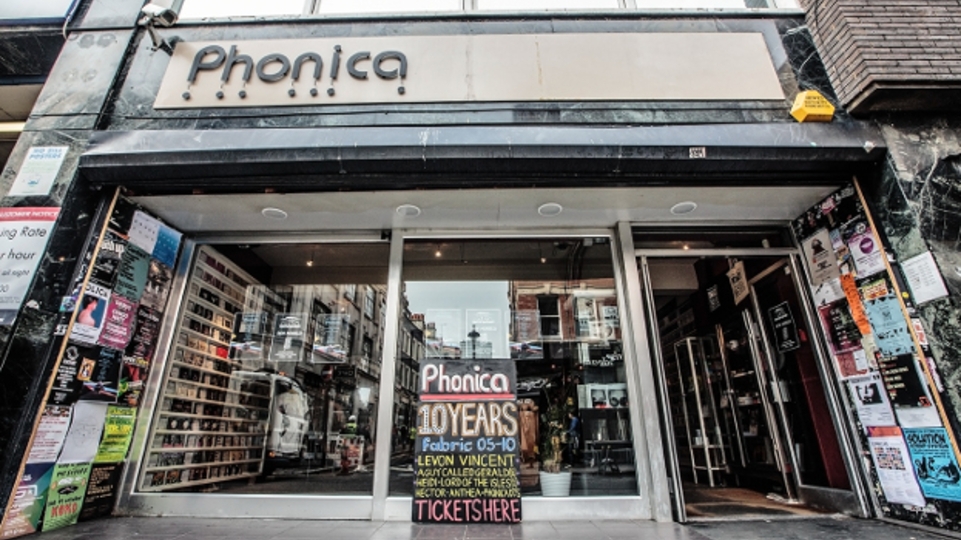
Opening a vinyl-only store in Soho just over 10 years ago was seen as a risky move. The area was, and still is, saturated with independent record shops and at the time, record shops were fighting for survival. But Phonica Records has proven resilient to music industry vagaries, changing formats and consumption habits, and a recession.
As well as doing the highly commendable job of consistently selling records, they put on parties with stellar line-ups, host infamous in-stores, have numerous releases across their three labels — Phonica Records, Phonica White and Phonica Special Editions — and an international presence.
So how have they got it right? The unanimous answer from patrons, friends and family seems to be great music and great people. Plus a lot of hard work.
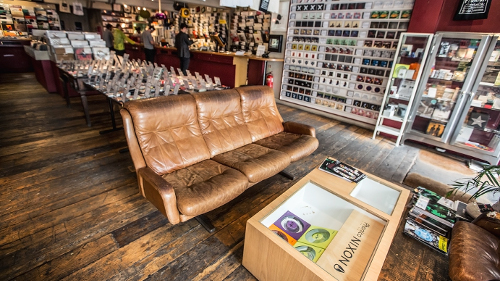
GREAT MUSIC
When The Vinyl Factory approached Simon Rigg about opening a new record store, he was already managing Koobla, an old vinyl outlet on Berwick Street. Offered “a complete blank slate” from the name to the interior design, Simon and fellow Koobla colleagues, Heidi Vanden Amstel and Tom Relleen jumped ship and set up shop over on Poland Street.
Unlike its peers of 2003, Phonica was never a genre-specific establishment.
“At the time, we were seen as the electro house shop and then the minimal shop, but we’ve always moved with the times,” explains Simon. “Even when it was all minimal and Villalobos remixes we were still selling loads of disco, nu-jazz and broken beat.”
That said, Phonica crafted itself an early niche by being the only place to stock the new music emerging from Germany at that time on labels such as Kompakt, Get Physical and Playhouse. In fact, Booka Shade’s 'Mandarine Girl' remains Phonica’s best-seller to date.
When it comes to buying in records for the store, making good decisions and making them quickly is imperative. Striving to get hold of new releases first has, for Simon, been vital to Phonica’s protracted popularity. “As a buyer, if you wait too long before you order something it’ll be gone because so few copies get pressed these days.”
Curation plays a pretty big part, too. With 100–150 new releases launching in-store and online every week, there’s an enormous amount of music to sift through. Interestingly, Simon thinks that the deluge of digital downloads has aided his function as a buyer. “For you to sell 300–500 copies on vinyl, it needs to be of a certain level. You have to be pretty certain of your music to go out on a limb and press it up, so there’s already a certain filter going on.”
However this doesn’t mean every record thrown Simon’s way is an automatic ‘yes’. “We can’t stock everything.... here, we mostly don’t stock stuff because it’s not the type of music we specialise in — it’s too hardcore techno or too drum & bass. Other shops do that better.
People expect there to be some kind of filter these days, otherwise you just become a warehouse.” But even then, he reckons they could get away with stocking 20% less. “There are lots of types of music we could stop selling .... but we do because we are all passionate about different genres.”
Sales at Phonica are apparently up but how has the shop been affected by protean formats, distribution and consumption patterns? “We’ve done interviews with the BBC, Spanish news and Brazilian news about vinyl sales booming,” replies Simon, “but they’re not. Speak to any house label — the ones that have survived — and 10 years ago they were probably doing 5000 copies a record and now it’ll be 500 if they’re lucky.
And I’m sure they’re not getting the difference in downloads.... the people who you’ve got left buying records are DJs, collectors and people who are serious about it, but luckily, for us, there are enough of them! In London, at least, people still have that passion for vinyl that you’ll never have with a CD or a track on your computer.”
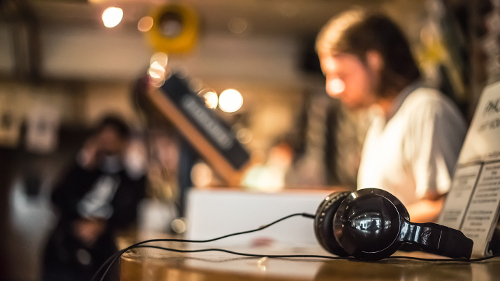
PEOPLE
Over the past decade, both sides of the Phonica counter have been graced by well-known industry names. On any one day you might catch Theo Parrish, Andy Weatherall, Ben UFO, Boddika. Floating Points, Daphni/Caribou, Soulwax, Jamie Jones or Seth Troxler doing their shopping, and it’s often the first port of call for international DJs flying in for gigs.
To those on the outside, working in the dance music industry is misconstrued as one big party minus the regretful repercussions. But it’s no different to any other job in that it requires organisation, discipline, knowledge and diligence. For Simon, the hard work of Phonica staff past and present is the reason behind the shop’s success but co-founder Heidi (of Radio 1 and The Jackathon fame) has been especially influential.
“Heidi was a big pull. She’s a bit of a character and she ran that counter. Sometimes people had a negative reaction to her but she made an impression and I think she should take a lot of the credit for getting the shop well-known and out there.” Likewise, Heidi’s time at Phonica was a pivotal moment for her.
“I gained so much knowledge about many genres of music and discovered new and exciting sounds. Every good thing that has happened in my life over the past 10 years started from working at Phonica.”
James Priestley, Pete Herbert, Jonny Rock, Hector, Anthea and Will Saul have all done stints at the shop.
“The exposure to so much quality music completely informed my A&R decisions in the early years of Simple and Aus. I wish I could still do one day a week there!” reflects Will Saul. Secretsundaze’s James Priestley, who worked there in 2004 describes it as ‘a privilege’ that caused envy amongst his DJ friends. He also makes a cogent point about why Phonica has continued to be such an important place.
“It opened at a time when record shops were falling like flies. For people to invest in a business in the way they did with Phonica, I think sent very positive messages about the scene, selling records, and London alike.”
For Midland, who was still collecting glasses when Phonica signed his first solo EP, “trips to Phonica are now as regular as trips to the supermarket, and I never fail to come out with great music”. And despite Trevor Jackson lamenting the fact he never gets discount, that he still buys music from there “speaks volumes”. For him Phonica is synonymous with “great staff and secondly, great music”.
But amazing staff and high-profile regulars tell just one half of the story. Phonica has a reputation for being one of the friendlier and more amenable record shops around, operating as much as a community hub as anything else.
“We’ve always encouraged it from the start — even with the design of the shop... we had the wall — because people like shopping that way — but then you’d always be able to flick through the racks, and serve yourself so to speak. And now of course you have the option of listening to everything online.
You don’t even have to come in! But, of course, the whole point is to interact and not just with the staff but with other customers too. I really like it when I hear people, strangers, saying; ‘Can I listen to that one after you’ or ‘This one’s really good’. People organise to meet their friends here and spend two hours listening to records. It’s such a nice vibe.”
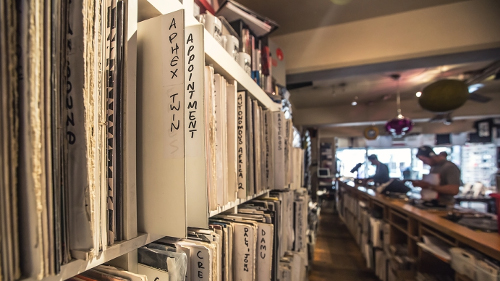
THE COMP
What’s so great about '10 Years of Phonica' is that, despite the label retrospective disc, there isn’t a whiff of tired nostalgia or self-congratulation about it — which feels like a highly symbolic and refreshing creative move. '10 Years of Phonica' was a collaborative effort between Simon, Vangelis, Nick Williams and Alex Egan (who also designed the artwork) with all the staff contributing in some way.
Only supposed to be a double-pack, it’s comprised of three discs — one label retrospective and two featuring exclusive commissions (with the exception of Trevor Jackson’s contribution) — and a vinyl sampler to follow shortly. Wanting to create something new that reflected the sort of sounds Phonica champions and the musical predilections of the staff, the commissions come from producers who’ve forged a connection with the shop over the years, a friends and family-type affair.
Given the nature of the individuals who put the comp together, injudicious selections were always going to be unlikely. It’s full of beautifully crafted tracks that are diverse — but within clear parameters. It effectively captures current sounds whilst having something ageless about it and, although dancefloor-friendly material is aplenty, there’s a slight skew towards home-listening.
Featuring tracks from the likes of Legowelt, Joe Claussell, Henrik Schwarz, STL and Juju & Jordash, the submissions from Moire, Ol, Lo Shea and Lord of the Isles are a testament to Phonica’s forward-facing mentality.
So, once the excitement of the '10 Years of Phonica' releases has quietened down, what else is on the cards? “Running the shop as well as we can, that’s what we try and do. We do a label because people come to us and we want to put out good music, and we do nights because we all want to go out and party and play records.” Pretty simple, really.
